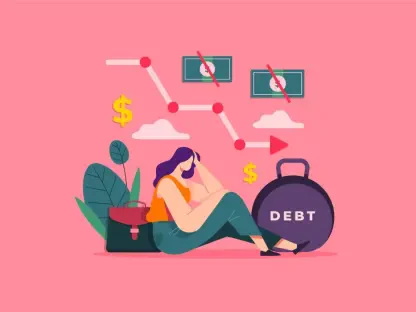In an unprecedented move to tackle soaring credit card debt, Republican Senator Josh Hawley and independent Senator Bernie Sanders introduced a bill aimed at capping credit card interest rates at 10% for five years. The bill seeks to offer much-needed financial relief to working families overwhelmed by credit card debt, which has hit a record $1.17 trillion in the United States. This measure aligns with a campaign suggestion made by former President Trump, responding to what the senators describe as exploitative practices conducted by major financial institutions.
Current Credit Card Interest Rates and Their Impact
Exorbitant Interest Rates
Both senators have criticized the nation’s current average credit card interest rate, reported by Forbes to be nearly 28.6%, compared to banks borrowing at less than 4.5% from the Federal Reserve. Sanders and Hawley argue that these staggeringly high-interest rates amount to extortion and loan sharking, benefiting not only the banks but also credit card networks like Visa and Mastercard. The two firms profit significantly from interest and fees imposed on consumers, further burdening families already grappling with financial insecurity. This scenario has been described as a form of legal thievery, putting an undue strain on American households.
Hawley pointed out the urgent need to put an end to such exploitative practices. He emphasized the stark contrast between the growing consumer debt and the rising profits of credit card issuers. Highlighting this disparity, the proposed 10% interest cap is posed as a simple yet effective solution designed to assist working people in managing their debt. This proposal has managed to garner preliminary bipartisan support, particularly during a Senate Judiciary Committee hearing in November, where Hawley positively referenced Trump’s suggestion. Despite these early signals of approval, the bill faces significant challenges and formidable opposition from influential sectors within the financial industry.
Opposition from Banking Associations
The American Bankers Association (ABA) and the Consumer Bankers Association (CBA) are staunch opponents of the proposed legislation. They argue that capping interest rates would inevitably lead to reduced access to credit for consumers, effectively pushing them toward higher-risk alternatives such as payday lenders. According to the ABA and CBA, the bill essentially represents a form of government price control.
Both organizations contend that historical precedents should serve as a cautionary tale, illustrating the inefficacy and potential harm of such measures. They stress that the bill could inadvertently harm consumers by limiting their credit options in critical situations. This sentiment underscores a broader skepticism toward government intervention in the free market, posing a substantial roadblock to the bill’s progress. These perspectives highlight the fundamental divide between efforts to regulate credit practices and concerns about preserving market dynamics.
Related Legislative Efforts
The Credit Card Competition Act
Meanwhile, Democrat Senator Dick Durbin and Republican Senator Roger Marshall have each pursued similar aims through the Credit Card Competition Act, aiming to increase competition within the credit card network industry. Despite their bipartisan efforts, their bill did not succeed in passing last year. The failure of this bill indicates potential challenges for the current proposal from Hawley and Sanders, suggesting that any significant reform in credit card interest regulations will need to overcome substantial hurdles, both legislative and political.
The Biden administration has also taken steps to address financial burdens on American households, particularly by targeting excessive credit card late fees and other such charges termed “junk fees.” The Consumer Financial Protection Bureau (CFPB), led by Director Rohit Chopra, has expressed support for measures aimed at reducing unnecessary financial onerousness on consumers. These efforts reflect an ongoing focus at the federal level to identify and eliminate exploitative financial practices.
Prospects for Financial Reform
In a significant initiative to address the escalating issue of credit card debt, Republican Senator Josh Hawley and independent Senator Bernie Sanders have jointly proposed a bill to cap credit card interest rates at 10% for the next five years. The objective of this legislation is to provide critical financial relief to working families who are currently burdened by credit card debt, which has reached an unprecedented $1.17 trillion in the United States. This legislative proposal is in line with suggestions made during former President Trump’s campaign. Senators Hawley and Sanders argue that the nation’s primary financial institutions are engaging in predatory practices that exploit consumers, leading to this staggering level of debt. If passed, this bill could significantly ease the financial strain on countless American households, offering them a more stable economic outlook. This measure represents a bipartisan effort to combat what is seen as an urgent financial crisis affecting millions of Americans.









